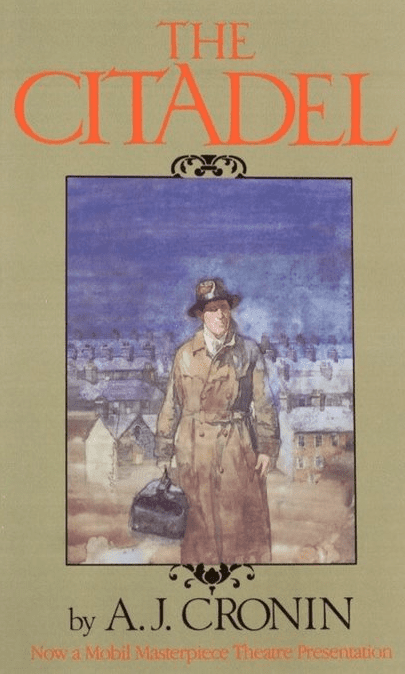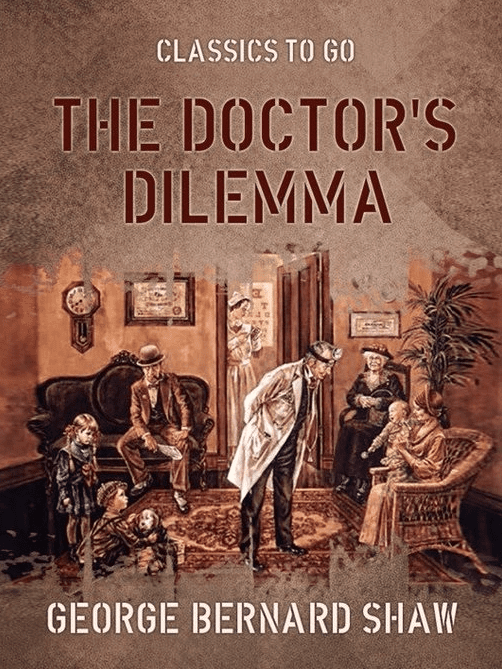Simon Wein
Petach Tikvah, Israel

Ethical behaviour of doctors is a timeless issue. A recent television investigation in Australia looked at legal but hardly ethical behaviour of doctors performing plastic surgery.1 Two books, a novel and a play written a century ago, remind us that problems with medical ethics are not new under the sun.
A.J. Cronin was born in Scotland in 1896 and died on the Continent in 1981. He was an excellent student, and his parents suggested a career in either the Church or in medicine. Cronin believed that he chose ‘the lesser of two evils.’2
Cronin was appointed Medical Inspector of Mines for Great Britain in 1924 based on his research into the relationship between coal-dust inhalation in impoverished Welsh mining-towns and pulmonary disease. He later worked in Harley Street. In 1930 at age thirty-four developed a duodenal ulcer and was told to recuperate at the countryside. He had always wanted to write a novel and with time on his hands he set about doing so. He quickly achieved great success in his writing, in particular with the novel The Citadel,3 and he never returned to medicine.
In The Citadel the main character, Dr Andrew Manson, started his medical career as an idealist country physician, together with his wife Christine. Success brought him to London where he gradually abandoned his ethics of doctoring for the lure of fashionable medicine and money. One day he was witness to a surgical colleague’s incompetent and uncaring attitude—reflecting Manson’s own practice—and the patient needlessly died. Manson repented of his ways and returned to his wife. But then surprisingly Christine is killed in a traffic accident.4 Why? Was it to punish Manson (although Christine had done no wrong)? Metaphorically his wife Christine represented the ideals of medicine—responsibility and trust. Maybe that is it. That Cronin in the end did not believe the pure social-medicine ideal is feasible. That this is another Citadel from which we must extricate ourselves.
There can never be a perfectly equitable healthcare system given the avarice of mankind. There would always be people with the wish and money to have ‘private’ care. Either because they want ‘the best’; or they do not want to be part of the riff-raff and wait in public spaces; or because it affords a sense of specialness which as we know protects us psychologically from the fear of death. Where there is a demand there will be a supply.
Cronin understood this and so ‘killed’ the ideal Christine and accepted the compromise. Most Western countries have a mixed public-private health economy with the relative percentage determined by culture, wealth, and the perceived quality of the nationalized healthcare system. Cronin had a religious upbringing and possibly let Christina die to expiate her husband’s sins, as her namesake did.

Cronin once said in an interview, ‘I have written in The Citadel all I feel about the medical profession, its injustices, its hide-bound unscientific stubbornness, its humbug … The horrors and inequities detailed in the story I have personally witnessed. This is not an attack against individuals, but against a system.’4
Cronin was concerned that doctors fortified themselves in their citadels of secret knowledge, like shamans and witch doctors of old, and used it as a source for power or money. At that time there was inadequate government oversight and there was great inequity of healthcare delivery. It has been suggested that the popularity of Cronin’s novels inspired the creation of the National Health Service in the United Kingdom.
George Bernard Shaw (1856–1950) wrote the play The Doctor’s Dilemma in 1906.5,6 It describes the moral dilemmas created by limited medical resources and the conflicts between the demands of private medicine as a business and of medicine as a Platonian ideal. Just as we see today, there is an inherent conflict of interest, something Cronin also hinted at.
Shaw, from an impoverished Irish background, left school early and was largely self-taught. It was only by virtue of his intelligence and rapacious acquisition of knowledge in his 20s in the British Library that he was able to haul himself up by his own bootstraps and stand on the podium in Stockholm City Hall to receive the Nobel Prize for Literature in 1926. His experiences in England lead him to local politics in an underprivileged area of London and later to a seat in the Irish Parliament.
Shaw belonged to the Fabian Society which was founded in 1884. It was a British socialist movement created to redress the inequities between the rich and poor. It believed in gradual socio-political change—not revolution, and in turn influenced the British Labour party.5
One of Shaw’s rationales for ‘socialized’ education and health was that it benefitted everyone in society. An educated workforce leads to a stronger economy. A healthier population means less cost to society.
The theme of the play remains current: in any time there will be treatments that are so scarce or costly that some people cannot afford them. Who is to decide, and on what grounds is the decision to be taken? This conflict became the ‘dilemma’ of the play.5
Doctors—then and now—perform procedures that may not be necessary, tempted as they are by financial gain. Sir Patrick in Act 1 expounds: ‘The father used to snip off the ends of people’s uvulas for fifty guineas. . . Cutler himself worked hard at anatomy to find something fresh to operate on; and at last he got hold of something he calls the nuciform sac, which he’s made quite the fashion.’4
Medicine today is in much better shape than a hundred years ago. There have been tremendous scientific advances with rigorous research methodology to sift the chaff from the grain. Government authorities and professional bodies oversee and monitor medical practice and its practitioners. However there are still, sadly, practices and practitioners at the penumbrae and shadows of the profession and of the law that appear unchanged from the days of Shaw and Cronin.1
The fiduciary relationship between doctor and patient is for good and obvious reasons private. Were that not to be the case, underground and shadowy medicine would proliferate. This is the nature of the beast and is at the core of the doctor and patient relationship. In this sense all medicine—public and private—is private and secret.
So when an orthopaedic surgeon has a pressing mortgage repayment to make and discusses with his patient the need for hip-replacement because of pain and dysfunction, such decisions cannot be regulated nor readily adjudged. In making such decisions the surgeon is not overtly corrupt—it is a serendipitous set of needs.
The oncologist who just received a paid trip to his favourite conference (by the by in his favourite resort town) by a particular pharmaceutical company feels obligated, morally as it were, to prescribe that version of the drug. Plastic surgery to reshape a nose is easier than relying on neural plasticity to learn new values and build self-esteem.1
The two books have important similarities: corrupt medical theories, greed for money and fame, the individual’s rights versus society’s needs, the heartless death of an individual. Both described in different literary genres and eras the failings of the medical profession and each in its way encouraged a measure of socialism and specifically the NHS in Britain. Curiously The Citadel won the National Book Award in USA as the ‘favourite’ novel of 1937.
In societies with mixed public-private healthcare, private care often takes up the slack from the public healthcare of the less-critical illnesses. Private medicine in this sense is an important public service.
In private medicine the incentive is to do more and make more money. A patient with advanced cancer in the private sector might be ‘innocently’ advised to go to intensive care even when the outcome is futile—because there is financial incentive to treat. Is this cynical? No. It is an inevitable and ineluctable outcome of human predation. One aspect of civilization is to tame our animal instincts—this is what both Shaw and Cronin were describing. To be civilized.
However, in the public system there are also incentives to perform more operations and procedures and see more patients, because that is a way of creating an apparent need and justify more funding.
In The Citadel Cronin passionately wrote against an unjust medical system that supported unethical medical practice. Shaw used all the tricks in his bag of satire with The Doctor’s Dilemma to make the medical profession look at itself, and for society to control its excesses. Both authors supported some centralization of medicine.
The take home lesson is to keep a vigilant eye on our ethical behaviour, together with independent oversight, and to not forget that doctors have the same human foibles as you and I.
References
- Cosmetic Cowboys: The unregulated world of cosmetic surgery. Reported by Adele Ferguson and produced by Klaus Toft. New South Wales, Australia: ABC Four Corners. Aired October 25, 2021. abc.net.au/4corners/cosmetic-cowboys/13603636.
- “A. J. Cronin.” Wikipedia. https://en.wikipedia.org/wiki/A._J._Cronin.
- Cronin, A.J. The Citadel. 1936.
- “The Citadel (novel).” Wikipedia. https://en.wikipedia.org/wiki/The_Citadel_(novel).
- “The Doctor’s Dilemma (play).” Wikipedia. https://en.wikipedia.org/wiki/The_Doctor%27s_Dilemma_(play).
- Shaw, G.B. The Doctor’s Dilemma. 1906. Project Gutenberg, 2021. https://gutenberg.org/files/5070/5070-h/5070-h.htm.
SIMON WEIN, MD, graduated medicine at the University of Melbourne and subsequently specialized in medical oncology, psycho-oncology, and palliative medicine. Currently he directs the Pain and Palliative Care Service at the Davidoff Comprehensive Cancer Center at Beilinson Hospital, in Israel. His main interests are the interaction of psychological and physical symptoms, improving the interaction of palliative care with medical oncology, and educating the next generation of oncologists.
Highlighted in Frontispiece Volume 15, Issue 1 – Winter 2023

Leave a Reply